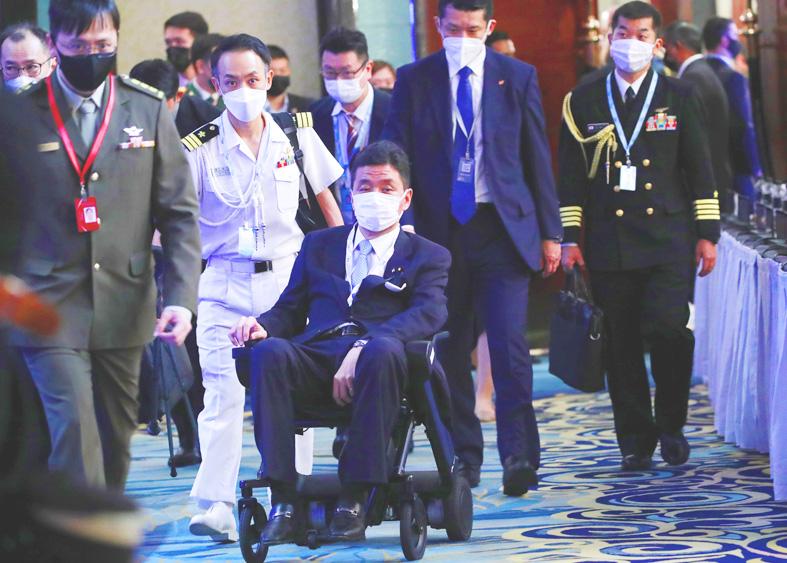Japanese Minister of Defense Nobuo Kishi yesterday highlighted the importance of peace and stability in the Taiwan Strait during talks with his Chinese counterpart in Singapore.
“The peace and stability of the Taiwan Strait is not only important to my country, but to the whole international community as well,” Kishi said in a bilateral meeting with Chinese Minister of National Defense General Wei Fenghe (魏鳳和) that was held on the sidelines of the Shangri-La Dialogue security summit.
On Saturday, Nobuo, US Secretary of Defense Lloyd Austin and South Korean Minister of National Defense Lee Jong-sup also met on the sidelines of the summit. It was the first time that the trilateral ministerial meeting had raised the issue of the situation across the Strait.

Photo: EPA-EFE
In the meeting, the defense ministers agreed on the importance of deepening trilateral cooperation on key issues to promote a free and open Indo-Pacific region, and voiced strong opposition against any unilateral actions to change the “status quo” and increase tensions in the region, a joint statement released after the meeting said.
“They emphasized the importance of peace and stability in the Taiwan Strait,” the statement said. “They also reaffirmed that all disputes should be resolved in a peaceful manner in accordance with the principles of international law.”
The statement came after Austin had in a speech at the summit earlier on Saturday warned China against taking a “coercive and aggressive” approach to its territorial claims, saying that the stakes were especially high in the Taiwan Strait.
“Maintaining peace and stability across the Taiwan Strait isn’t just a US interest. It’s a matter of international concern,” Austin said, addressing China’s “growing coercion” against Taiwan, as Chinese military planes have flown near Taiwan in record numbers in the past few months.
“The stakes are especially stark in the Taiwan Strait,” he said.
At the trilateral meeting, the three defense officials also discussed North Korea, the statement said.
They pledged that Washington, Tokyo and Seoul would cooperate closely on their commitment to achieve complete denuclearization and establish permanent peace on the Korean Peninsula, the statement said.
The defense officials affirmed the importance of the full implementation of relevant UN Security Council resolutions made by the international community, it said.
It was the first trilateral defense ministerial meeting among the three countries in two-and-a-half years, after a similar meeting in November 2019.

WAITING GAME: The US has so far only offered a ‘best rate tariff,’ which officials assume is about 15 percent, the same as Japan, a person familiar with the matter said Taiwan and the US have completed “technical consultations” regarding tariffs and a finalized rate is expected to be released soon, Executive Yuan spokeswoman Michelle Lee (李慧芝) told a news conference yesterday, as a 90-day pause on US President Donald Trump’s “reciprocal” tariffs is set to expire today. The two countries have reached a “certain degree of consensus” on issues such as tariffs, nontariff trade barriers, trade facilitation, supply chain resilience and economic security, Lee said. They also discussed opportunities for cooperation, investment and procurement, she said. A joint statement is still being negotiated and would be released once the US government has made

Authorities have detained three former Taiwan Semiconductor Manufacturing Co (TMSC, 台積電) employees on suspicion of compromising classified technology used in making 2-nanometer chips, the Taiwan High Prosecutors’ Office said yesterday. Prosecutors are holding a former TSMC engineer surnamed Chen (陳) and two recently sacked TSMC engineers, including one person surnamed Wu (吳) in detention with restricted communication, following an investigation launched on July 25, a statement said. The announcement came a day after Nikkei Asia reported on the technology theft in an exclusive story, saying TSMC had fired two workers for contravening data rules on advanced chipmaking technology. Two-nanometer wafers are the most

NEW GEAR: On top of the new Tien Kung IV air defense missiles, the military is expected to place orders for a new combat vehicle next year for delivery in 2028 Mass production of Tien Kung IV (Sky Bow IV) missiles is expected to start next year, with plans to order 122 pods, the Ministry of National Defense’s (MND) latest list of regulated military material showed. The document said that the armed forces would obtain 46 pods of the air defense missiles next year and 76 pods the year after that. The Tien Kung IV is designed to intercept cruise missiles and ballistic missiles to an altitude of 70km, compared with the 60km maximum altitude achieved by the Missile Segment Enhancement variant of PAC-3 systems. A defense source said yesterday that the number of

Taiwanese exports to the US are to be subject to a 20 percent tariff starting on Thursday next week, according to an executive order signed by US President Donald Trump yesterday. The 20 percent levy was the same as the tariffs imposed on Vietnam, Sri Lanka and Bangladesh by Trump. It was higher than the tariffs imposed on Japan, South Korea and the EU (15 percent), as well as those on the Philippines (19 percent). A Taiwan official with knowledge of the matter said it is a "phased" tariff rate, and negotiations would continue. "Once negotiations conclude, Taiwan will obtain a better